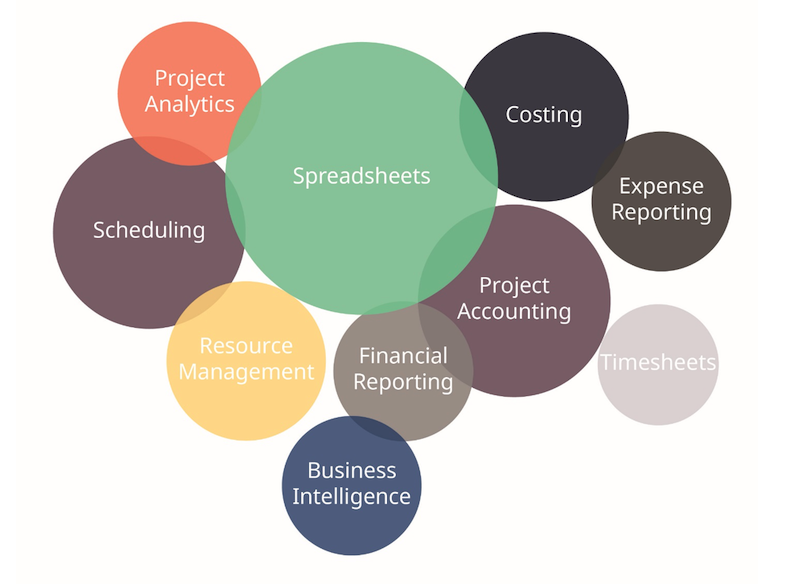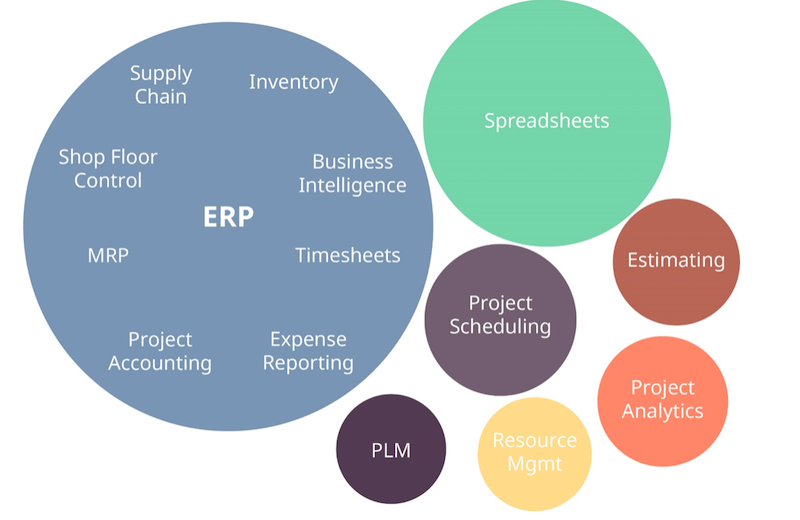Project Business Automation: Large Manufacturers Learn to Integrate Disparate Systems
By Thomas R. Cutler
Much attention has been paid to the small and mid-sized manufacturer. As local and regional job creators that attention has been well-deserved.
However, the reality is large manufacturers continue to represent a significant portion of jobs within the sector, and new solutions geared to their needs are among the most innovative and dynamic.
Project Business Automation (PBA) is a new category of business systems built specifically to support large project-based manufacturers from end-to-end.
PBA allows companies to operate with real-time visibility and control. Any large manufacturer that delivers its goods or services to its customers through projects will find PBA ideal.

25% of all large manufacturers require Project Business Automation
Project-based industries represent between 20 to 30 percent of all large manufacturers, most of which require their own business system. Traditional systems do not work for this type of manufacturing process.
Typically, a business system is any technological system that supports a business’ operations from end-to-end, such as an Enterprise Resource Planning (ERP) solution. ERPs were originally designed for traditional industries with high-volume, repeatable processes.
The term ERP was originally used by the Gartner Group to represent a system that encompassed the capabilities of material requirements planning (MRP), and later, manufacturing resource planning (MRP II).
As such, it is blatantly obvious that these traditional systems do not support large manufacturing project businesses.

Typical application landscape for project-based large manufacturers
To compensate for the lack of support from traditional ERPs, a large project manufacturer typically employs between 10 and 15 systems and applications to manage its business processes.
The mix of applications used invariably includes massive amounts of spreadsheets. To manage this limitation, most large manufacturers employ controllers and data processors to export, import, and consolidate data from these different systems.
They manipulate the data to create reports for executives attempting to manage the business with this information. It is a deeply flawed and antiquated methodology for large project-based manufacturers in 2021.

Disjointed data utilization suffers two major problems: Lack of visibility and Lack of Control
Project business executives typically have very little visibility into the current real-time status of their projects and therefore the business as a whole. Under their current fragmented application landscape, they may receive weekly status updates and monthly overviews.
Sadly, this information is already outdated by the time they receive it, due to the time required to consolidate the data and generate reports.
As a result, issues and risks go unnoticed until they have grown into drastic production crises which risk the entire project. Decision-making becomes extremely difficult for large manufacturers of project business operations with limited, outdated, and inaccurate information.
The result of this disparate application landscape is a lack of control over the operations. Since work and information flows are not connected, trying to standardize or insert a mechanism of control over such a landscape is impossible.
The lack of visibility and control leads to poor business performance. Project timelines and budgets slip, margins erode, and cash flow dissipates.
The PBA solution
The solution to a non-integrated mode of operation is to integrate. That is precisely the function of a PBA solution. It standardizes, integrates, and systemizes all project business processes data for large manufacturers.
This single system automates project business processes (including the core elements of Project Financials, Project Operations, and Project Insight).
Adeaca built the first Project Business Automation system, providing an all-in-one business management solution for project-based companies.
Their expertise in project-based industries, together with Microsoft’s enterprise platform, Dynamics 365 Finance, delivers a comprehensive solution that is used by large manufacturing companies worldwide.
About the author: Thomas R. Cutler is the President and CEO of Fort Lauderdale, Florida-based, TR Cutler, Inc., celebrating its 22nd year. Cutler is the founder of the Manufacturing Media Consortium including more than 8000 journalists, editors, and economists writing about trends in manufacturing, industry, material handling, and process improvement. Cutler authors more than 1,000 feature articles annually regarding the manufacturing sector. Nearly 5,000 industry leaders follow Cutler on Twitter daily at @ThomasRCutler. Contact Cutler at trcutler@trcutlerinc.com.

